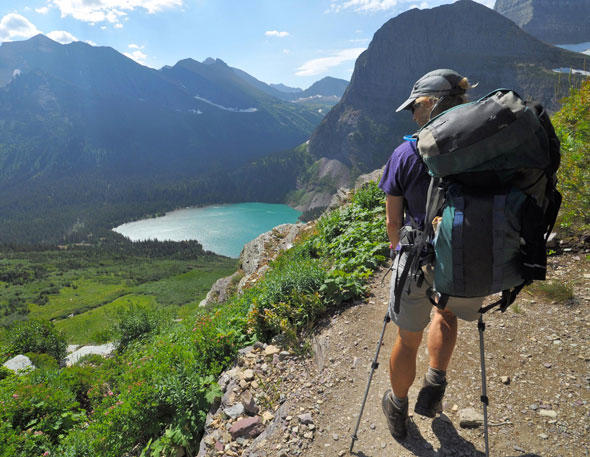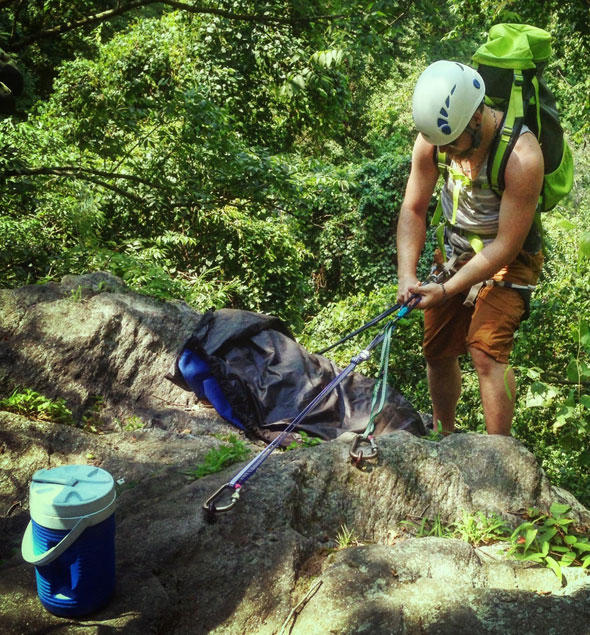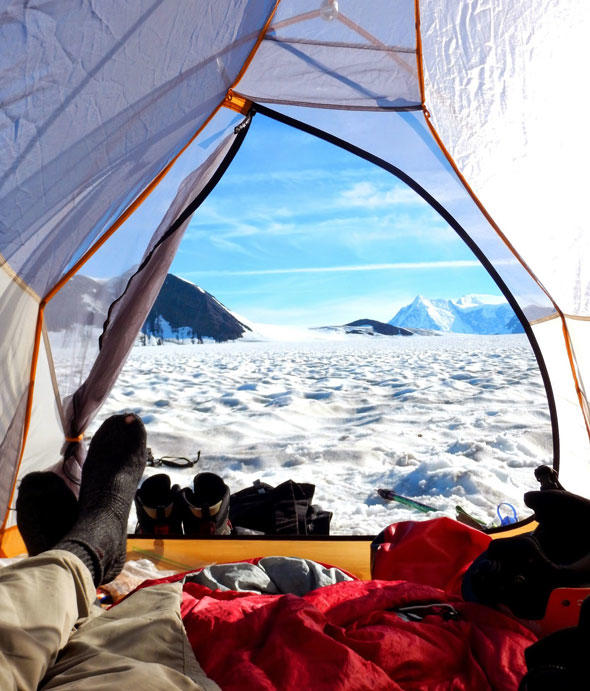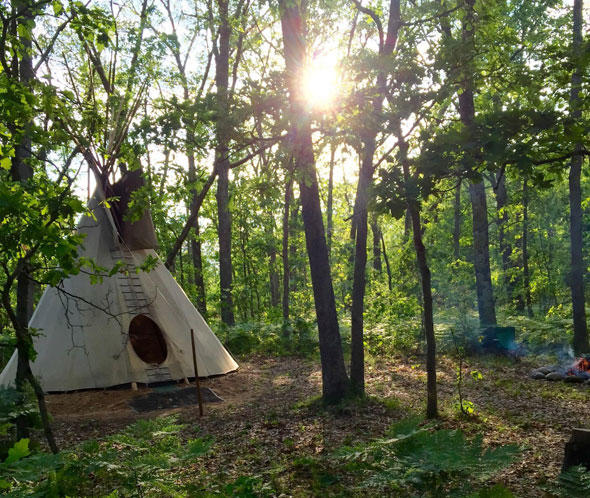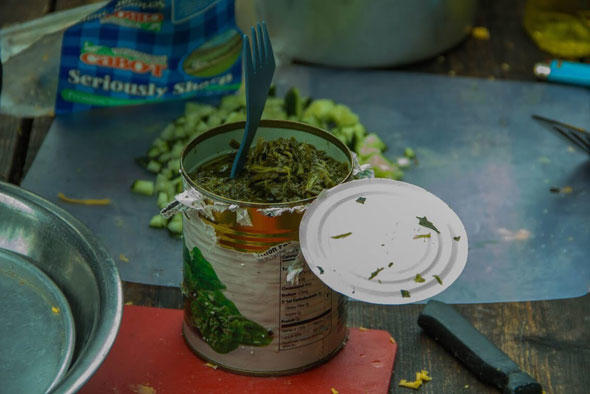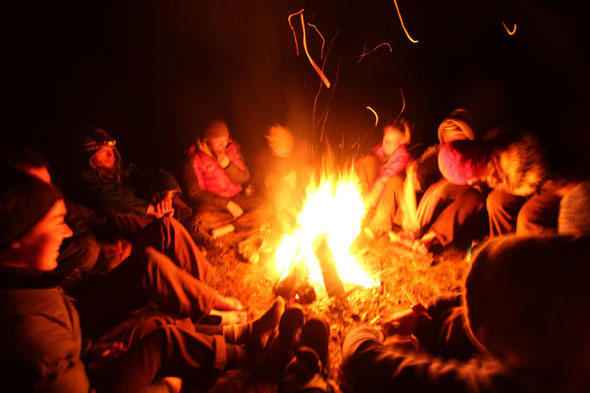Camping is awesome! Here at the Student Conservation Association (SCA), we’ve seen nature skeptics transformed into outdoors-loving conservation evangelists by little more than a well-planned weekend of hiking in the woods and sleeping under the stars. Powerful, right?
That’s why we’ve created this quick-reference camping guide—to share camping’s awesome power with as many potential conservationists as possible. Compiled by SCA outdoor experts who spend weeks and months at a time living on the land, this guide contains the most important things you need to know before you unplug and head out for your next (or even first!) nature experience. After a night under the stars, we are pretty confident you too will soon join us in serving the planet.
Where do you want to camp?

You have to know before you go. Here’s how to pick a site near you:
- Consider buying a guidebook for local parks and outdoor activities, or checking one out from the library. Guides are a great supplement to online research, and you don’t need a 4G signal to access them.
- Consider printing online resources for easy reference, or saving them as PDFs to your phone—speaking of which, always bring an extra battery!
- Start with a park near where you live, as you will be more comfortable and familiar with the weather patterns.
Equipment:

Once you’ve decided where you want to camp, it’s time to make sure you have all the equipment and clothing necessary for a safe, fun, and enjoyable trip.
Three major categories to think about when preparing for your camping trip are:
- kitchen equipment and food;
- in and around camp; and
- clothing and footwear.
The following list is for general guidance when determining what you and your family may need on your trip. Call ahead and find out what resources are available at the campground before heading out so you don’t forget something or bring a bunch of things you don’t need. The list may seem intimidatingly long, but that’s because it’s meant to encompass a variety of possible plans. You may not need everything on here.. Consider the activities you want to do and use this list as a general guide.
Worried about the cost of all these materials? Consider renting some of the more expensive items to save yourself some money. Websites like the one featured here are a good option, as are stores like REI, which often have solid gear rental programs. Even cheaper: borrow what you need from a camping-crazy friend.
No matter what you have planned, make sure and equip yourself with the basics for these four essentials: Food, Fire, Water, and Shelter.
Clothing

Go with wool and technical fabrics, as non-cotton clothing dries faster and stays warm when wet (ex. wool, fleece, synthetics, etc.) Bring extra layers for nighttime temperature drops and never leave home without your raingear!
Basics:
- Long-sleeve shirt and pants
- Hat
- Bandana or Buff
- Boots or shoes suited to terrain
- Socks (synthetic or wool)
- Long underwear
- Sleepwear (long johns work great, so bring more than one pair.)
- Insulating jacket or vest
- Rain gear
Add-ons:
In and Around Camp

Basics:
- Tent, tent footprint, stakes
- Screen house or tarp
- Rope (for hanging tarp)
- Sleeping pad
- Sleeping bag
- Pillow (extra clothes make for great pillow substitute)
- Multi-tool or pocket knife
- Daypacks or smaller packs for excursions
- Headlamp or flashlight with extra batteries
- Map of area
- Water filter or iodine tablets
- Water bottles (2L per person minimum)
- Sunscreen
- Bug repellant
- Travel-Sized First Aid Kit
Add-ons:
- Bikes and helmets
- Fishing gear and license
- Child carrier
- Folding lawn chairs or other camp furniture
Folding table if tables are not available at campsite
- Trekking poles
- Mallet or hammer for tent stakes
- Local firewood (Do not travel with firewood. Purchase near camp site or onsite.)
Kitchen

Basics:
- Stove and/or grill and fuel
- Matches and/or lighter
- Pots and pans
- Plates and/or bowls
- Cutting board
- Mixing bowls
- Knife
- Biodegradable dish soap
- Pot scrubber/sponge(s)
- Dish rags/ pot holders
- Cooler with ice or ice packs
- Trash & compost bags’
- Small mesh strainer for food scraps
Add-ons: (depending on your meal plan)
- Can opener
- Rubber spatula
- Grater
- Metal/plastic spatula
- Large spoons
- Tongs
- Measuring cup and spoons
- Colander
SCA’s Top Tips:

And now, the very most important things to know before you head out to experience the great outdoors!
- Plan your trip ahead of time – set goals that are reasonable for your group’s experience level
- Create an evacuation plan and share it with your group. Hopefully you won’t need it, but you’ll certainly be glad to have it if you do.
- Gather your food and equipment well ahead of time. Make a list of everything you need to bring and triple check that you have everything before you hit the road. While some things won’t be particularly missed if you forget to pack them, a night without a sleeping bag might make for an unpleasant experience…
- Test your equipment a few days before you hit the road. You don’t want the first time you attempt to pitch your new tent to be in the middle of a torrential downpour. Similarly, if your sleeping bag has, say, grown a layer of mold since the last time you used it, that’s something you’ll want to know about before you’re way out in the middle of the woods.
- Be sure to register for a campsite well before the date of your trip. It is not unusual for campgrounds to fill up, especially popular sites, and especially during peak seasons.
- Fill empty plastic water, soda, or drink bottles with water and place them in the freezer the day before you depart for your trip. This will save you money on purchasing ice, and bottles stay frozen longer than cubes. Additionally, you won’t end up with a cooler full of water and submerged food when your ice eventually melts.
- Store all food and scented items in your vehicle or an animal resistant container (lots of parks provide them) when sleeping or away from camp. Never store these items in your tent. The smell of open or poorly stored food tends to attract attention from animals that you don’t want waking you up in the middle of the night—from bugs, to opossums to <gulp> bears!
- Prepare some of your food ahead of time: remove excess packaging to reduce trash; slice what you can in your kitchen to cut down on prep time in camp, and even consider preparing full meals at home to simply reheat at your campsite.
- Stay hydrated! Drink lots of water during your camping trip. Dehydration can lead to injury or at the very least make for a far less pleasant camping experience. Only consume water from tested sources or that’s been treated by one or more of the methods recommended by the CDC.
- Be ready for the temperature to drop at night, especially if you’re camping in the mountains, or in any season besides the hottest part of the summer. Always bring layers and keep them easily accessible. Extremities chill first, so pack a hat, gloves, and warm non-cotton socks along with your jacket and a base layer. Bring an extra pair of long underwear for pajamas, as you shouldn’t sleep in the sweat-chilled clothes you wore during the day..
- Do not spray bug spray on your tent or rain gear! While it seems like the logical place to spray, the chemicals in most bug sprays will ruin waterproof coating. Trust us, a leaky tent will cause you at least as much misery as a few bug bites.
- Share detailed travel plans with a trusted friend or family member back home. They need to know where to look for you if something goes wrong, and when to start worrying if you haven’t returned.
- Register at the campground or park where you’re staying or hiking. This is helpful to the park for record-keeping purposes, and could be helpful to you if, say, you get lost or someone needs to contact you.
- Before you leave, research the area you plan to visit. Knowledge will help keep you safe, and illuminate opportunities for fun.
- Once you arrive, ask park staff to recommend places to explore and visit–they often know of great, hidden areas you would never find out about online or in books!
- Become familiar with and practice the Leave No Trace 7 Principles for Outdoor Ethics. This will allow you to minimize your impact on the environment, and help ensure an enjoyable visit for others. It will also help make sure the park remains in good shape for future visits for you and your family.
- Clean your equipment as soon as you get home, then lay it out to dry thoroughly. Mold and grime can take years off the life of a good tent or sleeping bag, plus, you just really don’t want to find a nasty surprise when your break out your gear for your next camping experience.

